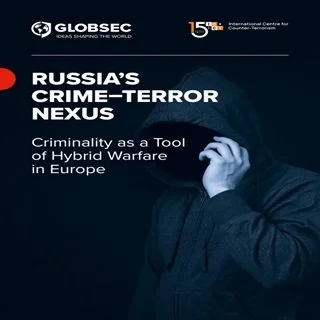By Kacper Rekawek, Julian Lanchès, and Maria Zotova
In this Report, Kacper Rekawek, Julian Lanchès, and Maria Zotova document how Russia has institutionalised a “crime-terror nexus” in its hybrid warfare strategy by recruiting criminal actors with weak societal ties across Europe to carry out kinetic and non-kinetic operations in support of state policy. They argue that since its full-scale invasion of Ukraine in 2022, this nexus has become central to Moscow’s ability to project power and evade accountability, and they offer policy recommendations to help European states and EU institutions detect, disrupt, and contain these criminally driven hybrid threats.
This report takes stock of Russian hybrid warfare in Europe in the context of its war of aggression against Ukraine. While doing so, it offers more than a catalogue of kinetic incidents attributed to Moscow; it focuses on the perpetrators and situates their actions within Russia’s longstanding reliance on hybrid warfare. This analysis highlights that many of these actors have criminal backgrounds and demonstrates how Russia has built its own state-driven “crime-terror nexus.” The phenomenon recalls earlier patterns seen in terrorist organisations such as ISIS, which recruited Europe’s criminals into violent campaigns under the guise of ideological redemption. This time, however, the state itself actively recruits and grooms socially marginalised, often Russian-speaking individuals residing in Europe to assist in state terrorism against European societies. This strategy complements the “spook-gangster” nexus that has for years underpinned Russia’s governance and operationalisation of foreign policy. Since the 2022 full-scale invasion of Ukraine, this nexus has become even more instrumental in mitigating the economic and geopolitical consequences of Moscow’s aggression. The report shows the extent to which criminality – whether through direct reliance on criminals to conduct attacks or through the “spook-gangster” nexus – constitutes a central pillar of Russia’s hybrid warfare. It opens with an overview of the phenomenon and traces Russia’s experience with hybrid tactics back to at least the 1920s. It then explores Moscow’s enduring use of criminality as a tool of domestic control and foreign policy, with particular emphasis on the post-2022 period. A brief comparative perspective highlights how other hostile state actors similarly integrate criminality into hybrid campaigns waged globally. All of these components build toward the report’s central focus: an assessment of Russia’s kinetic campaign as an integral part of its broader hybrid warfare, and of the actors enabling it. The final section provides practical recommendations to inform policies for both national authorities and EU institutions.
GLOBSEC and the International Centre for Counter-Terrorism (ICCT)2025. 23p.





